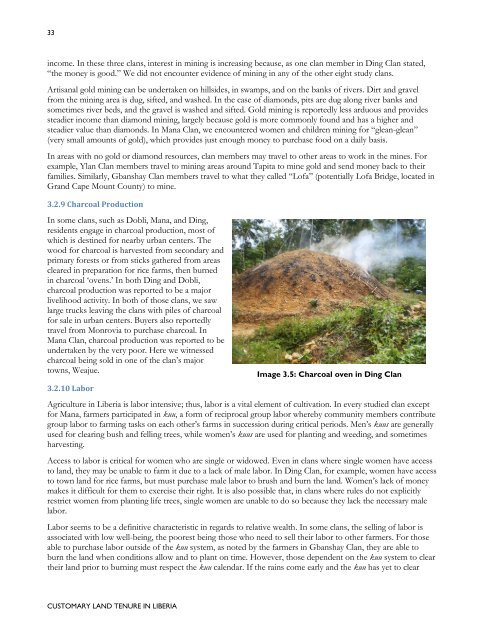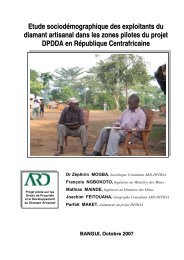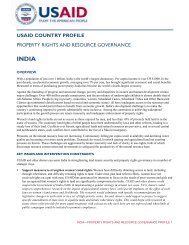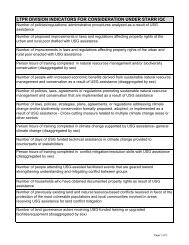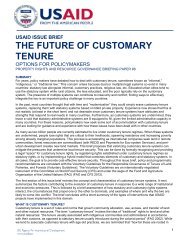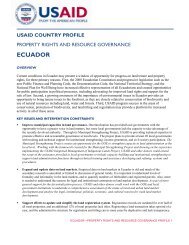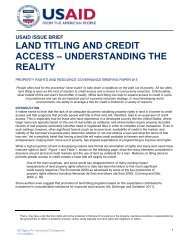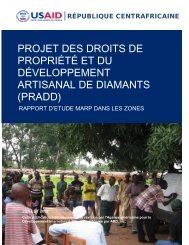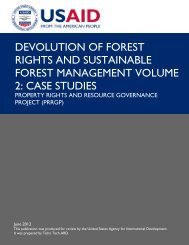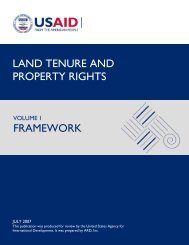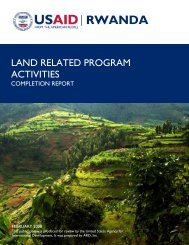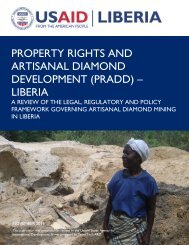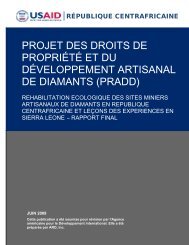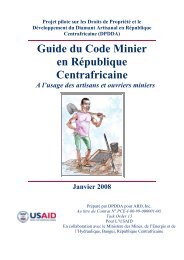Customary Land Tenure in Liberia - Land Tenure and Property ...
Customary Land Tenure in Liberia - Land Tenure and Property ...
Customary Land Tenure in Liberia - Land Tenure and Property ...
Create successful ePaper yourself
Turn your PDF publications into a flip-book with our unique Google optimized e-Paper software.
33<br />
<strong>in</strong>come. In these three clans, <strong>in</strong>terest <strong>in</strong> m<strong>in</strong><strong>in</strong>g is <strong>in</strong>creas<strong>in</strong>g because, as one clan member <strong>in</strong> D<strong>in</strong>g Clan stated,<br />
“the money is good.” We did not encounter evidence of m<strong>in</strong><strong>in</strong>g <strong>in</strong> any of the other eight study clans.<br />
Artisanal gold m<strong>in</strong><strong>in</strong>g can be undertaken on hillsides, <strong>in</strong> swamps, <strong>and</strong> on the banks of rivers. Dirt <strong>and</strong> gravel<br />
from the m<strong>in</strong><strong>in</strong>g area is dug, sifted, <strong>and</strong> washed. In the case of diamonds, pits are dug along river banks <strong>and</strong><br />
sometimes river beds, <strong>and</strong> the gravel is washed <strong>and</strong> sifted. Gold m<strong>in</strong><strong>in</strong>g is reportedly less arduous <strong>and</strong> provides<br />
steadier <strong>in</strong>come than diamond m<strong>in</strong><strong>in</strong>g, largely because gold is more commonly found <strong>and</strong> has a higher <strong>and</strong><br />
steadier value than diamonds. In Mana Clan, we encountered women <strong>and</strong> children m<strong>in</strong><strong>in</strong>g for “glean-glean”<br />
(very small amounts of gold), which provides just enough money to purchase food on a daily basis.<br />
In areas with no gold or diamond resources, clan members may travel to other areas to work <strong>in</strong> the m<strong>in</strong>es. For<br />
example, Ylan Clan members travel to m<strong>in</strong><strong>in</strong>g areas around Tapita to m<strong>in</strong>e gold <strong>and</strong> send money back to their<br />
families. Similarly, Gbanshay Clan members travel to what they called “Lofa” (potentially Lofa Bridge, located <strong>in</strong><br />
Gr<strong>and</strong> Cape Mount County) to m<strong>in</strong>e.<br />
3.2.9 Charcoal Production<br />
In some clans, such as Dobli, Mana, <strong>and</strong> D<strong>in</strong>g,<br />
residents engage <strong>in</strong> charcoal production, most of<br />
which is dest<strong>in</strong>ed for nearby urban centers. The<br />
wood for charcoal is harvested from secondary <strong>and</strong><br />
primary forests or from sticks gathered from areas<br />
cleared <strong>in</strong> preparation for rice farms, then burned<br />
<strong>in</strong> charcoal „ovens.‟ In both D<strong>in</strong>g <strong>and</strong> Dobli,<br />
charcoal production was reported to be a major<br />
livelihood activity. In both of those clans, we saw<br />
large trucks leav<strong>in</strong>g the clans with piles of charcoal<br />
for sale <strong>in</strong> urban centers. Buyers also reportedly<br />
travel from Monrovia to purchase charcoal. In<br />
Mana Clan, charcoal production was reported to be<br />
undertaken by the very poor. Here we witnessed<br />
charcoal be<strong>in</strong>g sold <strong>in</strong> one of the clan‟s major<br />
towns, Weajue.<br />
3.2.10 Labor<br />
Image 3.5: Charcoal oven <strong>in</strong> D<strong>in</strong>g Clan<br />
Agriculture <strong>in</strong> <strong>Liberia</strong> is labor <strong>in</strong>tensive; thus, labor is a vital element of cultivation. In every studied clan except<br />
for Mana, farmers participated <strong>in</strong> kuu, a form of reciprocal group labor whereby community members contribute<br />
group labor to farm<strong>in</strong>g tasks on each other‟s farms <strong>in</strong> succession dur<strong>in</strong>g critical periods. Men‟s kuus are generally<br />
used for clear<strong>in</strong>g bush <strong>and</strong> fell<strong>in</strong>g trees, while women‟s kuus are used for plant<strong>in</strong>g <strong>and</strong> weed<strong>in</strong>g, <strong>and</strong> sometimes<br />
harvest<strong>in</strong>g.<br />
Access to labor is critical for women who are s<strong>in</strong>gle or widowed. Even <strong>in</strong> clans where s<strong>in</strong>gle women have access<br />
to l<strong>and</strong>, they may be unable to farm it due to a lack of male labor. In D<strong>in</strong>g Clan, for example, women have access<br />
to town l<strong>and</strong> for rice farms, but must purchase male labor to brush <strong>and</strong> burn the l<strong>and</strong>. Women‟s lack of money<br />
makes it difficult for them to exercise their right. It is also possible that, <strong>in</strong> clans where rules do not explicitly<br />
restrict women from plant<strong>in</strong>g life trees, s<strong>in</strong>gle women are unable to do so because they lack the necessary male<br />
labor.<br />
Labor seems to be a def<strong>in</strong>itive characteristic <strong>in</strong> regards to relative wealth. In some clans, the sell<strong>in</strong>g of labor is<br />
associated with low well-be<strong>in</strong>g, the poorest be<strong>in</strong>g those who need to sell their labor to other farmers. For those<br />
able to purchase labor outside of the kuu system, as noted by the farmers <strong>in</strong> Gbanshay Clan, they are able to<br />
burn the l<strong>and</strong> when conditions allow <strong>and</strong> to plant on time. However, those dependent on the kuu system to clear<br />
their l<strong>and</strong> prior to burn<strong>in</strong>g must respect the kuu calendar. If the ra<strong>in</strong>s come early <strong>and</strong> the kuu has yet to clear<br />
CUSTOMARY LAND TENURE IN LIBERIA


